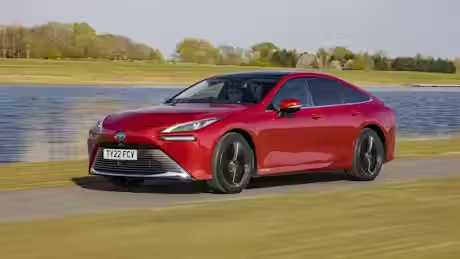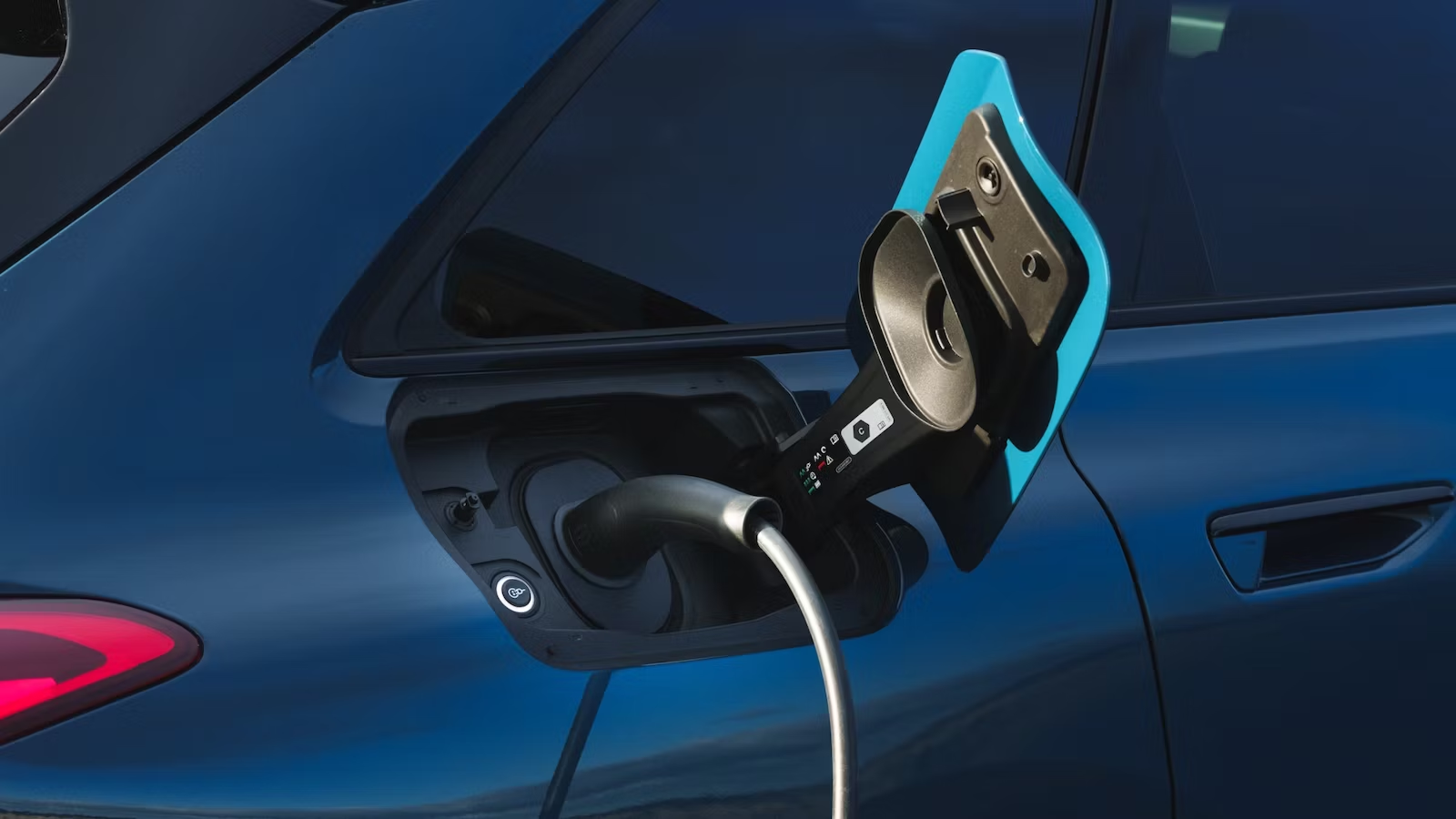Hydrogen vs electric cars: Which is better?
February 18, 2025 by David Motton

Before long, we’re all going to be driving electric cars. Or are we? Just like electric cars, hydrogen vehicles promise no harmful exhaust emissions. But whereas electric cars take a long time to charge, a hydrogen car can refuel from a pump, just like a regular car.
At the moment, the number of electric cars on the road dwarfs the number of EVs. But fans of hydrogen technology will tell you we are missing a trick by underestimating the potential of hydrogen vehicles. Are hydrogen cars a real alternative to the battery electric cars that carmakers now see as the future of zero-emissions motoring? Will hydrogen cars replace electric cars? And which is more sustainable?
We consider the current state of hydrogen and electric cars, compare what each offers and look at which ones we’ll be driving in the future.
What is a Hydrogen car and how does it work?
Hydrogen cars are technically hydrogen fuel cell cars, because they’re fitted with a fuel cell that is essentially a small hydrogen-fuelled power station.
High-pressure hydrogen gas is pumped into the car’s fuel tank, which combines with oxygen from the air around it and is fed to the hydrogen fuel cells, where it comes into contact with the anode and cathode. An electrochemical reaction takes place, the hydrogen molecules breaking into protons (water) and electrons (electricity) to power the car.
The water is waste and the only emission from a hydrogen car – as you can see in Mat’s review of the Toyota Mirai. The electricity produced is stored in a battery, which powers a motor that moves the wheels, like a regular EV.
Advantages of a hydrogen car
- Refilling a fuel tank is quicker than charging a battery.
- Water vapour is the only exhaust emission.
- Most hydrogen vehicles have a long range on a tankful.
- Energy is used more efficiently than in a car with an internal combustion engine.
Disadvantages of a hydrogen car
- The number of hydrogen filling stations in the UK is tiny.
- Hydrogen production can create pollution, depending on the method used.
- There are very few hydrogen cars available.
- Hydrogen cars are expensive.
- Although more efficient than a petrol or diesel, hydrogen fuel cell vehicles are not as efficient as battery electric vehicles.
What is an electric car and how does it work?
Electric vehicles (EVs) are powered by electricity, stored in a rechargeable battery array, which drives an electric motor: the motor then creates a magnetic field that turns a rotor shaft, which drives the car’s wheels. Most electric cars use one motor, but some models have two or even three motors, offering more power.
Battery packs in EVs comprise stacks of lithium-ion cells, like the ones in a smartphone or laptop battery. The batteries are rechargeable, so must be plugged into a mains outlet to charge, either at home or at a public charge point.
EVs also feature regenerative braking, which takes energy from the wheels when the driver applies the brakes, which would previously just have been lost, and uses it to top up the battery.

Advantages of an electric car
- Wide choice of makes and models.
- Many more charging points than hydrogen refuelling stations.
- More efficient than a hydrogen vehicle.
- Usually cheaper to buy than a hydrogen car.
- EVs are less complex than a fuel cell vehicle.
Disadvantages of an electric car
- Recharging takes longer than refuelling.
- Expensive to charge if you can’t install a charging point at home.
- Battery capacity gradually degrades over time.
Hydrogen cars vs electric cars: which is better?

Driving range
Hydrogen cars
A Toyota Mirai has an official range of 357-402 miles. That’s further than most electric cars will go on a charge.
Electric cars
The driving range will vary from model to model. Around 200-250 miles is a realistic range for many modern EVs, but some cars won’t travel so far.
Efficiency
Hydrogen cars
While a hydrogen fuel cell vehicle is more efficient than a car with an internal combustion engine, it’s not as efficient as a battery electric vehicle.
Electric cars
An electric car is very efficient, converting more of the energy it consumes into movement than a hydrogen car.
Refuelling time
Hydrogen cars
This is a big win for hydrogen. Cars can be refuelled in three to five minutes, roughly the same length of time that it takes to refuel a petrol or diesel car.
Electric cars
Even if you can find an ultra-rapid charger, you’ll be lucky to recharge from 10-80% in under half an hour. If charging at home, it will take many hours.
Ownership cost
Hydrogen cars
Hydrogen cars are expensive to buy, and hydrogen isn’t very cheap. A full tank for a Toyota Mirai will cost around £70-£120 depending on where you fill up.
Electric cars
Electric cars are expensive compared with petrols and diesels, but cheaper than the tiny number of hydrogen vehicles. Recharge overnight at home on an EV tariff and you could pay around 7p per kWh of electricity. That means a cost of less than £5 to fully charge a typical family car.
Performance
Hydrogen cars
The Toyota Mirai will do 0-62mph in 7.8 seconds. That’s Carwow’s figure, not Toyota’s.
Electric cars
Many electric cars are much quicker than the Toyota Mirai. For example, a Tesla Model 3 will sprint to 62mph in as little as 2.9 seconds, depending on the exact model.
Safety
Hydrogen cars
Fears around the safety of hydrogen, which is highly flammable, seem to be unfounded. A hydrogen car’s fuel tank is designed to withstand a severe collision. In fact, Toyota says the Mirai’s fuel tank can survive close-range gunfire!
Electric cars
An electric car can be just as safe as any petrol or diesel. Several electric cars have scored the maximum five stars in Euro NCAP safety tests.
Emissions
Hydrogen cars
Hydrogen cars emit harmless water vapour, nothing more. However, the true emissions of a hydrogen vehicle depend on how the hydrogen is produced. It’s a very green fuel if it comes from water and electrolysis, powered by renewable energy (such as wind or solar). There is a higher environmental cost if the hydrogen is refined from methane gas or coal gasification.
Electric cars
There are no exhaust emissions from an electric car. However, there are emissions in the production of the vehicle and the extraction of the raw materials used. The carbon footprint of driving an EV depends on whether the electricity is generated from a renewable source. The greener the electricity, the greener the EV.
Hydrogen cars vs electric cars: which is more sustainable?
This is a thorny question. You could argue that hydrogen cars take the lead on this point, as they don’t need a large battery, packed with rare metals and which has an environmental cost at both ends of its life. They still have a battery of course, but it’s much smaller than an EV’s.
The trouble is, a battery EV is more efficient than a hydrogen car. So, as a rule a battery-electric car needs less energy than a hydrogen vehicle to go the same distance. Using less energy to do the same job is more sustainable.
Will hydrogen cars replace electric cars?
No. Fans of hydrogen cars might wish they would replace EVs, and the advantage of being able to refuel quickly is a significant one. But battery-electric vehicles have a huge head start on hydrogen cars in terms of sales to date and infrastructure.
Hydrogen cars face a chicken-and-egg problem. The public refuelling infrastructure is tiny, which puts off potential buyers. But because there are so few hydrogen cars, there’s no strong business case to build more hydrogen refuelling stations.
Meanwhile, the number of electric cars on UK roads is now well over a million. It’s easy to knock the public recharging network, but finding somewhere to charge an EV is much easier than tracking down a hydrogen refuelling station.
We’d expect hydrogen to find its place, potentially with buses and HGVs. A bus regularly returns to a depot, which could house its own hydrogen filling station. And HGVs will benefit from rapid refuelling and from avoiding the huge weight of battery necessary to give an HGV a long range.
For cars, though? No, we can’t see hydrogen vehicles replacing electric cars, although as the technology improves and costs come down, they may be sold alongside EVs.
Hydrogen cars vs electric cars FAQs
Are hydrogen cars better than electric cars?
No, not better. At the moment, battery electric cars suit more buyers and are more affordable to buy and run than a hydrogen vehicle.
Why is hydrogen not the future?
You can go cross-eyed if you stare at a crystal ball for too long, but hydrogen cars are less efficient than battery electric ones and the necessary infrastructure just isn’t there. Hydrogen cars may be part of the future, but it’s unlikely hydrogen will be the power source of choice for most car buyers.
Cars Change? Carwow!
Looking for a new set of wheels? With Carwow you can sell your car quickly and for a fair price – as well as find great offers on your next one. Whether you’re looking to buy a car brand new, are after something used or you want to explore car leasing options, Carwow is your one stop shop for new car deals.















